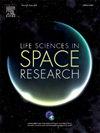Tryptophan metabolites are altered when Caco-2 cells are exposed to simulated microgravity
IF 2.8
3区 生物学
Q2 ASTRONOMY & ASTROPHYSICS
引用次数: 0
Abstract
Microgravity, as experienced during spaceflights, can disrupt cellular function and metabolism, including critical pathways such as tryptophan metabolism. This study investigates how simulated microgravity influences the tryptophan pathway and serotonin production in intestinal Caco-2 cells under different experimental conditions. Cells were exposed to dextran sodium sulfate (DSS) and lipopolysaccharide (LPS), known pro-inflammatory agents, and co-cultured with human fecal samples to evaluate the impact of microbiota-derived factors. Using targeted liquid chromatography-tandem mass spectrometry (LC-MS/MS), significant alterations in tryptophan metabolites were observed under simulated microgravity. A significant increase in serotonin and quinolinic acid levels was observed when Caco-2 cells were exposed to simulated microgravity compared to those maintained under terrestrial conditions. Treating Caco-2 cells with DSS we observed an increase in serotonin, kynurenic acid and quinolinic acid levels in samples exposed to simulated microgravity compared to controls. Furthermore, exposure to simulated microgravity in conjunction with LPS treatment led to a significant increase in quinolinic acid levels. Additionally, in microgravity conditions, when Caco-2 cells were co-cultured with stool samples, an increase of serotonin and tryptophan levels was observed. All together, these findings suggest that microgravity, in combination with specific inflammation stimuli, can modulate serotonin synthesis in intestinal cells, potentially contributing to the alteration of gastrointestinal regulation during long term space missions.
当Caco-2细胞暴露于模拟微重力时,色氨酸代谢物发生改变
正如在太空飞行中所经历的那样,微重力会破坏细胞功能和新陈代谢,包括色氨酸代谢等关键途径。本研究探讨了不同实验条件下模拟微重力对肠道Caco-2细胞色氨酸通路和血清素产生的影响。将细胞暴露于已知的促炎剂葡聚糖硫酸钠(DSS)和脂多糖(LPS)中,并与人类粪便样本共同培养,以评估微生物源性因素的影响。利用靶向液相色谱-串联质谱(LC-MS/MS),在模拟微重力下观察到色氨酸代谢物的显著变化。Caco-2细胞暴露在模拟微重力环境下时,血清素和喹啉酸水平明显高于维持在地面条件下的细胞。用DSS处理Caco-2细胞,我们观察到与对照组相比,暴露于模拟微重力下的样品中血清素、犬尿酸和喹啉酸水平增加。此外,暴露于模拟微重力与LPS处理相结合导致喹啉酸水平显著增加。此外,在微重力条件下,当Caco-2细胞与粪便样本共培养时,观察到血清素和色氨酸水平升高。总之,这些发现表明,微重力与特定的炎症刺激相结合,可以调节肠道细胞中的血清素合成,可能有助于长期太空任务期间胃肠道调节的改变。
本文章由计算机程序翻译,如有差异,请以英文原文为准。
求助全文
约1分钟内获得全文
求助全文
来源期刊

Life Sciences in Space Research
Agricultural and Biological Sciences-Agricultural and Biological Sciences (miscellaneous)
CiteScore
5.30
自引率
8.00%
发文量
69
期刊介绍:
Life Sciences in Space Research publishes high quality original research and review articles in areas previously covered by the Life Sciences section of COSPAR''s other society journal Advances in Space Research.
Life Sciences in Space Research features an editorial team of top scientists in the space radiation field and guarantees a fast turnaround time from submission to editorial decision.
 求助内容:
求助内容: 应助结果提醒方式:
应助结果提醒方式:


